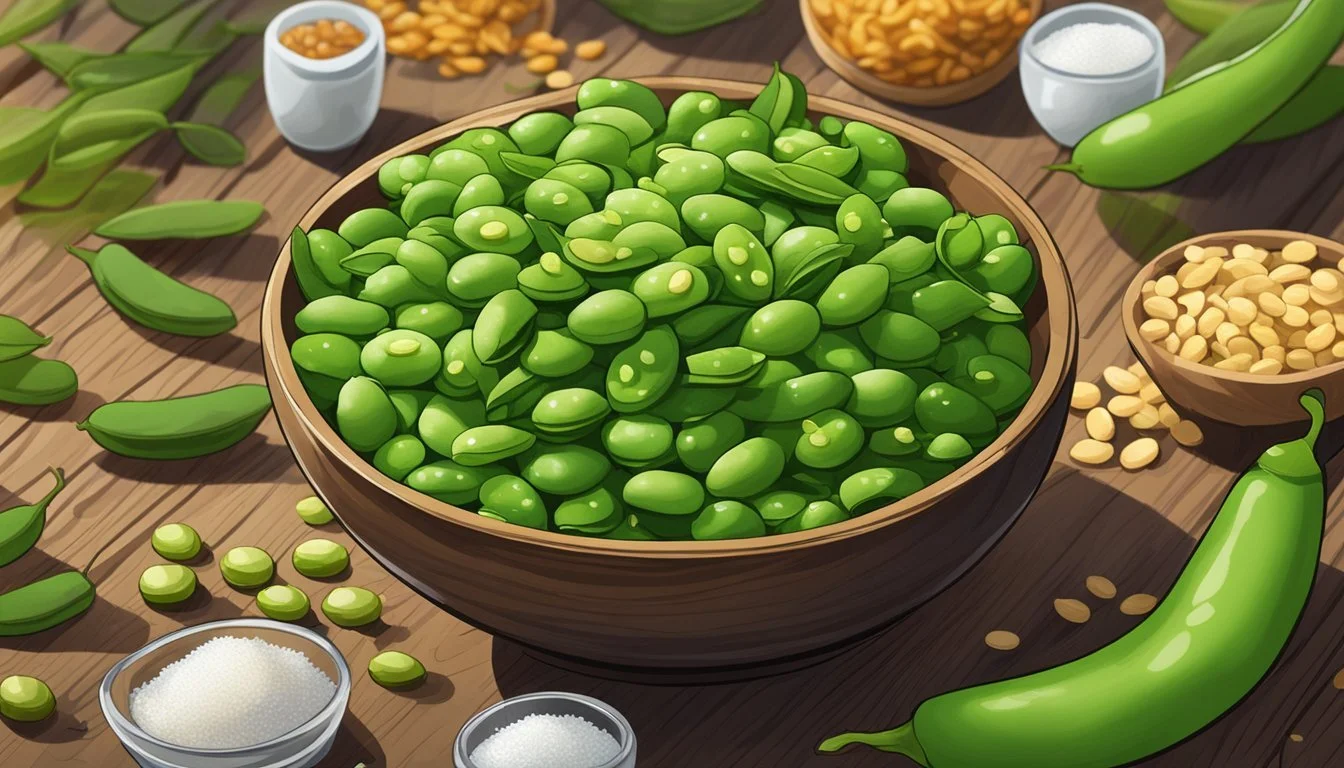5 Protein-Rich Snacks to Keep You Energized
Boost Your Day
Maintaining energy levels throughout the day can be challenging, especially with the demands of busy lives. Choosing the right snacks is crucial for sustaining energy and staying productive. This article highlights five protein-rich snacks that not only curb hunger but also keep you energized.
Protein is an essential nutrient that plays a key role in muscle repair, hormone production, and overall health. Incorporating high-protein snacks into your diet can help maintain steady energy levels and support overall well-being.
1) Greek Yogurt with Honey
Greek yogurt with honey provides a delicious and nutritious option for a high-protein snack. Combining the creamy texture of Greek yogurt with the natural sweetness of honey creates a balanced and satisfying treat.
Greek yogurt is known for its high protein content, typically offering around 10-20 grams of protein per serving. It also provides essential nutrients like calcium, potassium, and vitamin B12.
Honey not only adds a touch of sweetness but also brings its own health benefits. It has antioxidant properties and contains small amounts of vitamins and minerals.
To prepare, simply add a tablespoon of honey to a serving of Greek yogurt. You can adjust the amount of honey to suit your taste. This combination can be enhanced by adding fruits like berries or banana slices for extra flavor and nutrition.
2) Almond Butter Protein Balls
Almond butter protein balls are a convenient and nutritious snack option. They combine flavorful almond butter with other wholesome ingredients to create a satisfying treat.
To make these protein balls, start by mixing wet ingredients like almond butter and maple syrup in a large bowl. This forms the base for the mixture.
Next, add dry ingredients such as protein powder and salt. Stir well until everything is fully combined. If the mixture is too thick, add water a teaspoon at a time.
For extra flavor and texture, you can include mix-ins like chocolate chips or cinnamon. Stir these additions well to ensure they are evenly distributed.
Once mixed, roll the mixture into small balls, about 1 to 1.5 inches in diameter. If you find the dough too sticky, a small amount of coconut oil on your hands can help.
After forming the balls, place them in the refrigerator to firm up. They can be stored in an airtight container for 4 to 5 days, making them perfect for on-the-go snacking.
3) Chickpea Hummus with Veggies
Chickpea hummus is a creamy and protein-rich dip made primarily from chickpeas, also known as garbanzo beans. They provide a solid protein boost, with approximately 16 grams of protein per cup.
Hummus also contains tahini, which adds more protein and healthy fats. It's seasoned with lemon juice, garlic, and olive oil, creating a flavorful and nutritious snack.
Pairing hummus with fresh veggies like carrots, bell peppers, and cucumbers enhances its nutritional value. These vegetables add fiber, vitamins, and minerals, making it a balanced and filling snack.
Preparing hummus is simple. Blend cooked chickpeas with tahini, lemon juice, garlic, and a bit of cold water or aquafaba until smooth. Adjust the seasoning to taste.
This snack not only keeps you energized but also satisfies mid-day hunger. It's perfect for those looking for a quick and healthy protein fix.
4) Cottage Cheese with Berries
Cottage cheese with berries is an easy, protein-packed snack perfect for any time of day. Combining cottage cheese with fresh or frozen berries provides a mix of protein, antioxidants, and fiber. This snack is not only nutritious but also refreshing and delicious.
For preparation, scoop cottage cheese into a bowl. Top with a generous amount of berries such as blueberries, raspberries, or strawberries.
To enhance the flavor, drizzle some honey or maple syrup over the berries and cottage cheese. You could also add a sprinkle of almonds or granola for an extra crunch and some healthy fats.
This snack is versatile and can be adjusted depending on your taste preferences. For a more savory option, consider adding fresh herbs like basil and a drizzle of balsamic glaze.
Cottage cheese with berries can be prepared in advance and stored in the refrigerator, making it a convenient grab-and-go option. It’s an excellent choice for a quick breakfast or a midday energy boost.
5) Edamame
Edamame, which are young green soybeans, are a fantastic protein-rich snack that can help keep energy levels high.
These beans offer a substantial amount of plant-based protein, making them a popular choice for both vegans and non-vegans.
Their preparation is simple, usually steamed or boiled, and they can be enjoyed with a sprinkle of sea salt or added to salads and soups.
Edamame is not only rich in protein but also packed with essential nutrients like fiber, iron, and calcium.
These nutrients contribute to overall health, supporting bodily functions and maintaining energy levels throughout the day.
In addition to being nutritious, edamame has a satisfying taste and texture, which can make it a go-to snack option.
Another advantage is their versatility in various dishes. They can be incorporated into dips, such as a unique edamame guacamole, or used in refreshing combinations like cucumber and edamame jars.
Due to their combination of protein and other nutrients, edamame helps in appetite control and supports muscle repair and growth. For people looking to maintain or lose weight, incorporating edamame can be beneficial to their diet.
Including edamame as a protein-rich snack option is both nutritious and practical.
The Importance of Protein-Rich Snacks
Protein-rich snacks play a crucial role in maintaining energy levels and supporting muscle growth. They help in sustaining energy throughout the day and contribute to muscle repair and development.
Boosting Energy Levels
Protein-rich snacks help in stabilizing blood sugar levels. Unlike sugary snacks, which can cause spikes and crashes in energy, protein ensures a steady release of energy. This keeps one feeling alert and focused.
Consuming snacks like lean meat slices or no-bake protein balls can provide sustained energy. Lean meats are low in calories but high in protein, making them efficient sources of long-lasting energy. Protein balls, rich in nuts and seeds, offer both protein and healthy fats, further promoting sustained energy.
Practical tip: Combining protein with fiber or healthy fats can enhance the energy-boosting benefits of the snack.
Supporting Muscle Growth
Adequate protein intake is vital for muscle repair and growth. Protein-rich snacks are especially important after workouts when the muscles need to recover and rebuild.
Snacks such as peanut butter celery sticks not only provide protein but also contain healthy fats that aid in muscle development. Tuna salad, with ingredients like Greek yogurt and celery, offers a high protein content essential for muscle repair. Regular consumption of these snacks can support strength training and muscle maintenance.
Did you know? Including protein-rich snacks can aid in managing hunger, preventing over-eating, and ensuring that muscles get the nutrients they need to grow and stay strong.
How to Choose the Right Protein-Rich Snacks
Selecting the right protein-rich snacks involves balancing nutritional value and understanding ingredient lists. Being mindful of both aspects can help ensure the snacks are both healthy and satisfying.
Considering Nutritional Balance
When choosing snacks, one should aim for items that offer a good mix of macronutrients. Snacks with a balanced ratio of protein, fat, and carbohydrates provide sustained energy. For example, a combination like Greek yogurt with nuts delivers protein along with healthy fats and carbs.
Fiber is another important factor. High-fiber snacks, such as roasted chickpeas, not only offer protein but can also aid digestion and keep you feeling full longer. Including fiber can help control hunger and maintain steady blood sugar levels.
Vitamins and minerals present in the snacks should not be overlooked. Foods like tuna salad can provide essential nutrients such as omega-3 fatty acids and vitamins B and D, which support overall health. Selecting snacks that also contribute to your daily micronutrient intake is key.
Reading Ingredient Labels
Checking ingredient labels is crucial in identifying high-quality protein-rich snacks. Look for items with minimal added sugars and artificial ingredients. For instance, peanut butter celery sticks made with natural peanut butter are preferable as they usually contain fewer additives.
Pay attention to serving sizes on the labels. A product may seem healthy at first glance, but the nutritional information per serving can reveal hidden calories or unwanted ingredients. For example, smoked salmon toast can appear low-calorie unless the portion size is too small to be filling.
Identifying allergens is also important. Common allergenic ingredients like gluten or nuts should be clearly marked, ensuring the snack is safe for those with dietary restrictions. Being vigilant about ingredients helps in making healthier, more informed choices.
By focusing on these details, one can choose snacks that not only meet dietary needs but also support overall well-being.
Incorporating Protein Snacks into Your Diet
Incorporating protein-rich snacks into your daily routine can help sustain energy levels and meet nutritional needs. Focus on timing, portion control, and nutrient combination for optimal benefits.
Timing and Portion Control
Eating protein-rich snacks at strategic times can maximize their benefits. It is effective to consume a protein snack post-workout to aid muscle recovery. Snacks with 10-20 grams of protein are ideal, as this helps replenish energy without excess calories.
Balancing snack portions prevents overeating. For example, a handful of nuts, a cup of Greek yogurt, or two boiled eggs offer substantial protein while remaining manageable in size. Monitoring portions ensures snacks complement rather than detract from your overall diet.
Combining with Other Nutrients
Pairing protein with other essential nutrients enhances the snack's effectiveness. Combining protein with healthy fats and fiber can improve digestion and satiety. For instance, peanut butter with celery sticks provides protein and fiber, promoting lasting fullness and steady energy.
Another great pairing is chia seeds and cow’s milk or soy milk for a protein-packed pudding. Adding fresh berries and nuts not only boosts the flavor but increases vitamin, mineral, and antioxidant intake. Integrating these elements creates more balanced and nourishing snacks.
Potential Risks and Considerations
When incorporating protein-rich snacks into a diet, it's crucial to be mindful of potential health risks, including allergies and the consequences of overconsumption.
Allergies and Sensitivities
Many high-protein snacks contain common allergens. Nuts, dairy products, and certain seeds are popular ingredients but can trigger allergic reactions in sensitive individuals. For instance, nuts like almonds and peanuts are frequent culprits.
People with dairy allergies should steer clear of snacks containing Greek yogurt or whey protein. Reading labels and being aware of cross-contamination risks in manufacturing is essential. Even trace amounts of an allergen can cause severe reactions in some cases.
Those with food sensitivities might experience digestive discomfort from certain protein sources. Plant-based proteins like soy may cause bloating or gas in sensitive individuals. Therefore, it's beneficial to select snacks that align with individual dietary needs and restrictions.
Overconsumption of Protein
While protein is vital for health, consuming too much can lead to adverse effects. Diets excessively high in protein can place stress on the kidneys, especially in individuals with preexisting kidney conditions. It's important to balance protein intake with other macronutrients like carbohydrates and fats.
Excessive protein intake can also lead to dehydration. Proteins require more water for digestion and metabolism, so it's crucial to drink plenty of water. Consuming a varied diet ensures that one gets all essential nutrients, not just protein.
Focusing on recommended daily allowances (RDAs) for protein can prevent overconsumption. For most adults, the RDA is 46 grams for women and 56 grams for men, although individual needs may vary based on activity level, age, and health status. Monitoring intake helps maintain a balanced and healthy diet.






